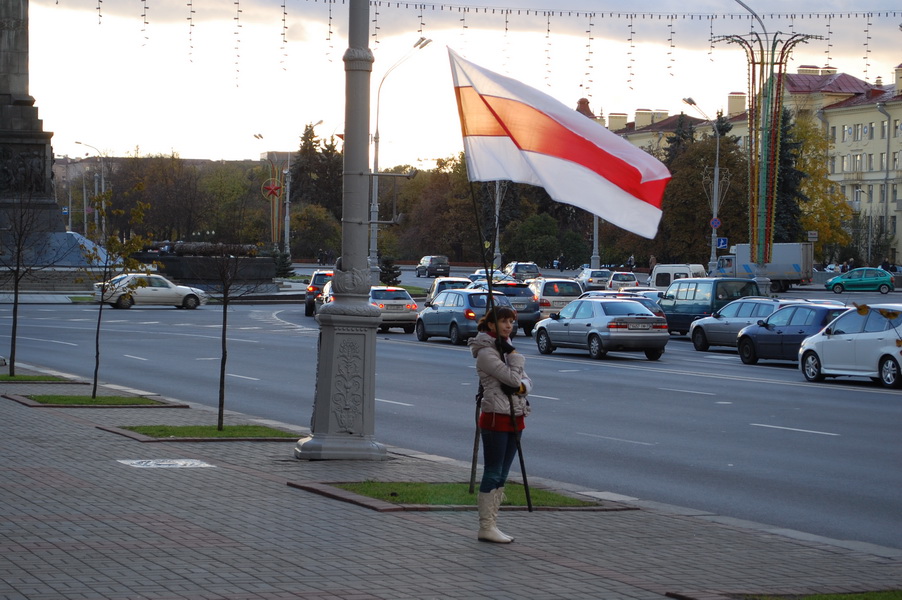Peaceful protests met with violence in Belarus
Authorities claim landslide victory for President Lukashenka in an election that was neither free nor fair.
August 10, 2020 -
Daniel Gleichgewicht
-
Articles and CommentaryHot Topics

Photo: Ilya Kuzniatsou. flickr.com
Belarusians took to the streets in towns across the entire country after polls closed on Sunday August 9th. The protests, which had been announced beforehand, started in the evening and continued late into the night. They seemed to take the well-prepared state security services and a regime not used to civic dissent by surprise with their reach and size.
The dreaded Belarusian branch of OMON answered the peaceful crowds with batons, flashbangs, rubber bullets and water cannons. In some instances there were reports of riot police lowering their shields. Even if the authorities switched off the internet and isolated Minsk from the rest of the country, short recordings of large crowds and police brutality soon appeared on social media. Protesters were also injured, harassed and arrested in cities outside the capital including Grodna, Homel, Vitebsk, Brest and several other locations.


According to the preliminary results released on Monday by the official state election commission, incumbent President Alyaksandr Lukashenka received 80 per cent of the vote. The leading figure of the opposition Sviatlana Tsikhanouskaya, had anticipated this outcome like most Belarusians. She had gone into hiding after nine of her staffers were arrested on Saturday, but reemerged the following day to cast her vote. No transparency together with a lack of observers from civil society and abroad have long been the main characteristic of elections in Belarus. With early votes making up almost half of the total, there were reports of polling stations running out of ballots as they claimed they had reached a 100 per cent turnout.
After an election campaign like no other before, the Belarusian society seems to have reached a tipping point. The new opposition now led by Tsikhanouskaya, has managed to awaken civil society uniting around the call for free elections and the removal of Lukashenka from power. The coronavirus response also seems to have hurt the president who has ruled the country for 26 years. The political elite surrounding Lukashenka will have little time to make decisions as the country of some 9.5 million inhabitants ventures into unknown territory with growing pressure both internally and externally.

The reaction of the Kremlin will be crucial for the developments on the ground in Belarus. With no Russian-speaking minority or strategically important ports to protect, the scenarios could vary if the unrest continues. Lukashenka has been a thorn in the eye of Putin’s Russia for some time, meaning an event like the Armenian Velvet Revolution could be possible, with for instance a character like the imprisoned Viktar Babaryka in the role of Nikol Pashinyan promising warm relations with Moscow in return for independence. Belarus’s large army with its generals trained in the east of the country could also have a role to play.
As for the EU, the Weimar triangle of Germany, France and Poland have gathered for a rare appearance calling for calm and restraint by the authorities in Belarus. The Baltic states will also watch the events closely with a worry. The US reaction has been nothing outside the norm, with earlier appeals to allow international observers in the elections. The West seems to approach the developments in Belarus with wariness. The focus on the ongoing pandemic and lessons learnt from the upheaval in Ukraine could also be factors.
The social contract that has been in place since Lukashenka rose to power in the early 1990s is crumbling before the Belarusians. The likely crackdowns on the democratic opposition and the desperate attempts by the regime to return to the earlier status quo in the coming weeks cannot reverse what has already come to pass.
As the protests are likely to continue, further violence and arrests could drive a tired Lukashenka to a situation reminiscent of Poland’s Marshall Law in 1981. Belarusians can only hope they will have the support of freedom loving friends from around the world as the Poles did back then.
Daniel Gleichgewicht is an editor with New Eastern Europe.
Dear Readers - New Eastern Europe is a not-for-profit publication that has been publishing online and in print since 2011. Our mission is to shape the debate, enhance understanding, and further the dialogue surrounding issues facing the states that were once a part of the Soviet Union or under its influence. But we can only achieve this mission with the support of our donors. If you appreciate our work please consider making a donation.

































